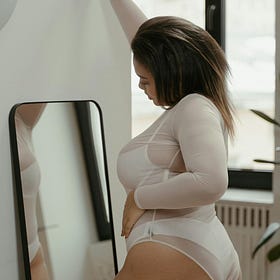The power of working toward body acceptance
... even if you're not sure you'll ever get there.
For most of us, body acceptance feels out of reach. Our negative self-perceptions run deep, and when we look in the mirror, we instinctively focus on perceived imperfections—the folds of fat, the wrinkles that didn’t used to be there. When we look at photos of ourselves, we cringe at the "flaws" we don't seem to see in others. It’s no surprise, of course. From a young age, we’re conditioned to conform to unrealistic beauty standards. When we inevitably fall short, we internalize the belief that there’s something wrong or unworthy about us. And while the popularized, commercialized versions of body positivity and "self-love" promise empowerment, they often fail to reflect the day-to-day challenges of living with the bodies we actually exist in.
Body acceptance offers something different. It’s not about achieving perfection; it’s about letting go of unrealistic standards and embracing the natural ebbs and flows of how we feel about and within our physical beings. Within this framework, acceptance starts to feel more accessible—even when it’s still out of reach.
The truth is, you don’t have to fully believe in acceptance to begin working toward it. The transition itself—moving toward acceptance, even when you’re not sure you’ll ever get there—holds its own power and can lead to surprising transformations.
When I first embraced intuitive eating two years ago, I loved everything about it—except my changing body shape. My clothes no longer fit, and my little pooch became a mound that made me feel like I was five months pregnant. The weight gain wasn’t a shock—I knew it might happen—but that didn’t make it any easier. In fact, it was one of the most challenging aspects of the transition. After years of dieting, I had no idea what my natural weight was, and the uncertainty about where my body would eventually settle made the process even more scary.
In those early months, I had to come to terms with the fact that I couldn’t control how my body would respond once I stopped dieting. Elyse Resch, co-founder of the movement and author of the original “Intuitive Eating” book, often talks about how even she can’t predict what will happen to someone’s body when they embrace this approach. It’s the big unknown, and one that makes many hesitant to even start.
Yet, many do. They reach a great tipping point where the promise of leaving their body and food hangups for good trumps the unknown.
That’s where I was, but it didn’t make gaining weight any easier. My reasons for quitting dieting were solid, but the discomfort was real.
‘Will I ever make peace with my body?’
“We’re aiming for body neutrality not body positivity,” my intuitive eating-certified therapist reassured me in those early months. I would begin every session telling her how great I felt about food but how much I disliked my body.
For the first year and a half, I went through all the stages of grief as I struggled with weight gain and the concept of acceptance.
I mourned my old body—the one that had never felt good enough when I lived in it but seemed so much better now in hindsight—and the countless years I’d wasted letting numbers on a scale dictate my self-worth. I got angry, convinced that if I hadn’t spent 40-something years dieting, I wouldn’t be as fat as I was now. I bargained with myself: Could I diet just enough to fit into straight sizes for more clothing options? Maybe shrink my stomach enough so it didn’t get in the way when I tied my shoes? But deep down, I knew the answers, and I raged against the unfairness of it all.
Yet somehow, even through the raging, I picked up mindfulness meditation. I learned to breathe through the big emotions versus stuffing them down, my old coping mechanism. On bad days, I deliberately chose to set aside those worries, promising myself I could revisit them another time. Gradually, I settled into an uneasy realization: I could completely change my relationship with food and undo all my hang-ups around eating, but I might never fully like my body.
A breakthrough
As time went on, I saw that even those who had made peace with food—including intuitive eating therapists and nutritionists—still faced body image struggles now and then. The key difference was that they had learned to sit with the discomfort, viewing it as a fleeting reaction, not something that required drastic action. It was a relief to realize I didn’t have to fight those feelings.
There would be times when I felt okay or even positive about myself, and other times when I felt anger, frustration, and even disgust. With practice, I got good at sitting with difficult emotions, separating feelings from facts and even feelings from my being. And it led to a bigger awakening, that being body positive doesn’t mean always loving your body.
The truth is, hating our bodies is a normal response to living in a society obsessed with thinness and perfection. And, more importantly, it doesn’t have to define our worth. We have the power to choose how we see ourselves, and to cultivate a relationship with our bodies that is grounded in respect and compassion.
Getting to acceptance
Just when I accepted I might never truly like my body, something unexpected happened: I became okay with it. More than okay, actually.
This summer, almost two years since I gave up diets and took up intuitive eating, I found myself appreciating and celebrating my body in ways I hadn’t in years. It started with vacation, which in the past had often triggered body insecurities. This time was different. On my family trip to Italy and Greece, instead of berating my body, I learned to appreciate it.
In Amalfi, we faced a daunting 80-plus steps from the street down to our cliff-side rental. I knew this before I booked it and hoped the views would make up for it.
“Let’s just leave all our bags in the trunk,” Hubs huffed as soon as we made it to Conca dei Marini. With his bad back, he knew I’d be doing the heavy lifting, but I knew leaving the bags wouldn’t fly with teenage daughters who need all their stuff. We compromised; I left one bag in the car and schlepped the rest down, certain I’d live to regret my decision.
But every day, multiple times a day, as I huffed and puffed my way up and down the cliffs, I celebrated my body for allowing me to do it. Every afternoon, as I made the climb from our rental to the nearest market, perched even higher, I thanked my legs for getting me there. It didn’t matter that my heart was pounding and I was out of breath; the spectacular views were the reward for a job well done.
We walked everywhere on that trip—from the tiny, winding streets of Oia in Santorini to the ancient ruins of Rome. My legs, always my center of strength, rose to every challenge. I felt stronger, and for the first time in a long time, I saw my body as the vessel that allowed me to experience these glorious places.
When I returned home, the confidence I gained on vacation followed me. I tackled mountain biking trails with renewed vigor, taking on technical features I hadn’t attempted in a few years. On walks with my handsome mutt Sterling, I approached neighborhood hills with gusto. And when I had an off day, instead of falling back into old habits of self-criticism, I treated myself with compassion.
This newfound confidence wasn’t just about feeling fit; I felt beautiful and sexy in a way I never had before. And surprisingly, it had nothing to do with my appearance.
Just by shifting my mindset, I unlocked a sense of self-worth that wasn’t tied to how I felt when I looked in the mirror, but on how fully I embraced and lived my life. It was radical. Shocking. It made me wonder, what other areas of life could this be applied to?
The big takeaways
Simply working toward acceptance—even if all we have is the tiniest sliver of hope—is enough to set things in motion. Our feelings about our bodies aren’t meant to be set in stone.
By taking small steps, without the pressure of a deadline or the expectation of achieving some perfect, idealized (and unattainable) state of self-love or body positivity, we can genuinely move toward a kinder, more compassionate relationship with ourselves. Over time, each step forward—and even the occasional backslide—builds resilience and fosters a deeper confidence that isn’t tied to the mirror but to how we choose to live our lives.
Acceptance isn’t a destination, it’s a process that deepens with practice.
Now, I’d love to hear what you think. What’s been your relationship with acceptance, either with your body or some other challenge you’ve faced? What was most helpful to you in your transition?
Related reading:
Body positivity and ‘The Power of Now’
We can use the principles of Eckhart Tolle’s famed book to help us manage difficult emotions when we’re uncomfortable with our appearance.
Breaking up with weight loss is hard to do
Lately, I’ve been hard core battling the I-hate-my-body-this-size vibes. In my dieting days, these intense feelings would often prompt a fresh wave of restriction! Now, I sit with them. Most weeks I work through them just fine, but sometimes the little things just keep eating away at me.









This was priceless! I struggle with my body that does not feel like me. Being slender all my life and then gaining weight during my fifties has been a challenge as I stubbornly refuse to accept how things are.
Hi Kristi, I'm coming to believe that appreciating our bodies no matter it's size or shape is important. I tend to be very critical of mine - not because of weight but because I can't do what I used to as easily or at all. I'm trying to turn that around and appreciate what I can and do do.